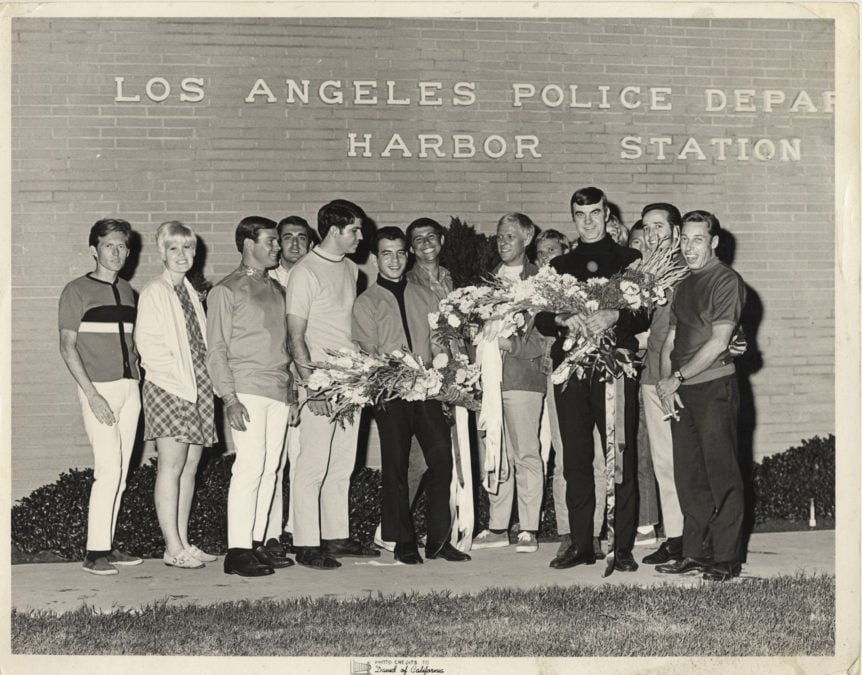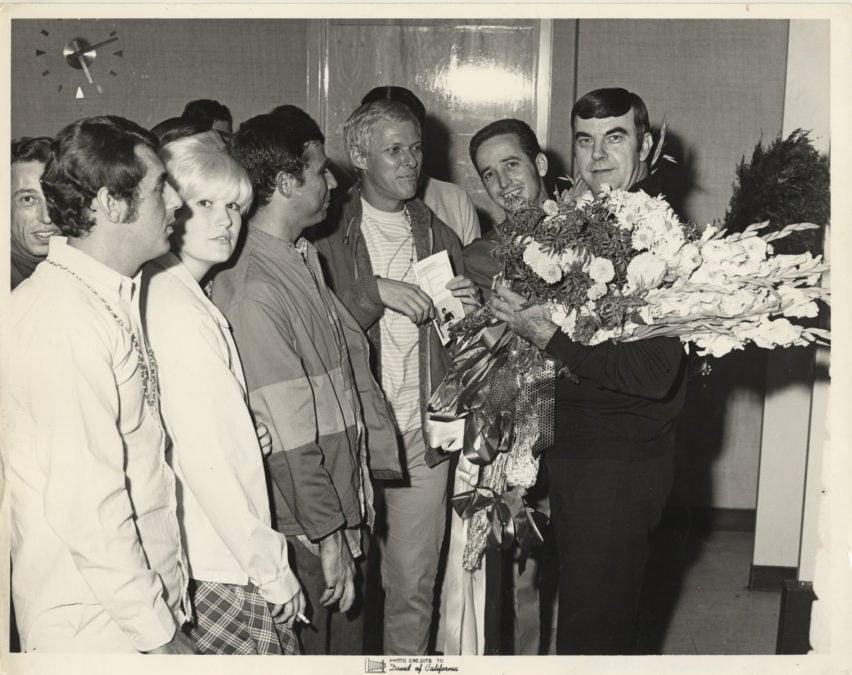More than 50 years ago, Lee Glaze, owner of the Wilmington gay bar The Patch, refused to comply with Los Angeles’ prejudiced law that outlawed same-sex couples from dancing in public.
Glaze fought the law with bravery and a campy sense of humor.
The Los Angeles ordinance forbidding same-sex dancing was passed July 2, 1958, and more than 10 years later, Glaze was relentless in his fight against it.
Lee Glaze fought police
The police department’s undercover vice squads would target the city’s gay and lesbian bars to make sure the obviously prejudiced law was being followed. If the cruel and ridiculous law was ignored, the police would harass and arrest customers.
Glaze, however, was one step ahead of the dancing police.
If Glaze spotted any covert officers, he would yell a campy code phrase to warn his customers, who knew the secret expression.
‘God save the queen’
“God save the queen,” Glaze would holler.
That warning also helped make Glaze a gay-rights pioneer who fought for LGBTQ equality. This year marks the 51st anniversary of a “flower power protest” that Glaze organized and led against police harassment at The Patch.
Glaze died in 2013 at the age of 75.
Glaze, known as “The Blonde Darling,” was a larger than life character with a campy personality, recognizable chuckle, and short blond hair.
Glaze’s brave efforts also were historically noteworthy.
Glaze had been warned by officers that if he didn’t want the Los Angeles police to close his Harbor-area gay bar, which was a quick drive from neighboring Long Beach, he had to follow the rules.
For example, no drag queens allowed in the bar, and men could not dance with each other. Also, only one person at a time was permitted inside bathrooms.

In this 1968 photo, patrons from The Patch, a gay bar in Wilmington owned at the time by Long Beach resident Lee Glaze, hold bouquets of flowers outside the Los Angeles Police Department Harbor Station during a “flower power” protest against police harassment. The protest is a significant milestone in gay history because it took place 10 months before the Stonewall Inn Riots in New York City. Glaze, with blond hair, holds flowers and looks to his right. Photo Q Voice News.
Making gay history
On Aug. 17, 1968, Glaze organized and led a nonviolent protest against the relentless police harassment and misconduct at The Patch. On this particular night, two of his customers were arrested.
Glaze’s bravery is significant because the protest took place 10 months before the Stonewall Inn Riots in New York City. Glaze’s actions also put the Long Beach area on the gay rights history map.
For some people, the national awakening on gay rights started at Stonewall. Glaze’s courage, however, shows the struggle for LGBTQ equality was born before Stonewall.
Before Stonewall, the Black Cat in Silver Lake had LGBTQ protest
Brave to step forward
“Lee was brave enough to step forward,” Michael Oliveira, an archivist with ONE Archives at the USC Libraries, told Q Voice News in 2017. “His contributions led to the growth and progress in gay rights that we are all enjoying today.” Glaze’s personal papers are housed at the ONE Archives.
On that night, three undercover vice officers targeted The Patch and arrested two men for lewd conduct.
Witness to gay history
Their crime?
Troy Perry, a former Southern Pentecostal minister, visited The Patch that evening and witnessed the incident. The two men were falsely arrested, Perry told Q Voice News in 2017.
The two men had only been talking to each other, and one of the men slapped the other on the butt, Perry said.
The men were jailed at the police department’s Harbor Station, but Glaze told the crowd that The Patch would post bail.

Lee Glaze, in white shirt, stands inside the Los Angeles Police Department Harbor Station as part of a “flower power” protest against police harassment. Glaze owned the Wilmington, California, gay bar The Patch, and three undercover vice officers targeted the bar and falsely arrested two customers. Photo: Q Voice News.
‘Flower power’ protest
Glaze also had an idea, Perry said. Glaze and about a dozen patrons went to a local flower store owned by one of the customers and scooped up every gladiola, mum, carnation, rose, and daisy in the shop.
Glaze and the demonstrators arrived at Harbor Station about 3 a.m.
“When we arrived at the police station, Lee told the officer at the desk, We’re here to get our sisters out,” Perry said. “The officer asked, What are your sisters’ names? When Lee said, Tony Valdez and Bill Hasting, the officer had this surprised look on his face and called for backup.”
Police perplexed
While they waited, the demonstrators staged a “flower power protest,” said Perry, noting that the police were perplexed and speechless.
“They didn’t know what to do with all the gay men waiting in the lobby,” Perry said.
The two men were released six hours later.
